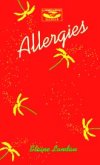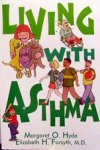Allergies: From Bee Stings to Peanuts Additional Information
You can learn more about allergies at kidshealth.org/kid/health_problems/allergy/allergies.html (KidsHealth for Kids), www.niehs.nih.gov/kids/asthma.htm (National Institute of Environmental Health Sciences), and www.asthmainashford.co.uk/kids_lungs.htm(Asthma in Ashford).
Raloff, Janet. 2003. Unexpected sources of peanut allergy. Science News Online (March 15). Available at http://www.sciencenews.org/articles/20030315/food.asp.
______. 2002. A rash of kisses. Science News 162(July 20):40. Available at http://www.sciencenews.org/articles/20020720/bob9.asp.
Seppa, Nathan. 2003. Tough nut is cracked: Antibody treatment stifles peanut reactions. Science News 163(March 15):163. Available at http://www.sciencenews.org/articles/20030315/fob1.asp.
Books recommended by SearchIt!Science:
 |
Allergies — Elaine Landau
Published by Twenty-First Century Books/Millbrook Press, 1994.
What happens in your body when you have an allergic reaction? You probably know someone who suffers from an allergy. They range from annoying to lethal. Learn what causes them, some of the most prevalent allergens, and what can be done to prevent them. Learn about the tests that detect them and exciting new research into ways to combat them. |
 |
Living with Asthma — Margaret O. Hyde, Elizabeth H. Forsyth
Published by Walker & Co., 1995.
Asthma is one of only three chronic diseases that are on the rise. Many people have asthma, yet they look perfectly healthy. Learn more about what asthma is, what triggers it, and some of the myths about this condition. Find out about the medicines that are used today and the modern treatments. Read about the special camps for children with asthma. |
Power Words
allergen Something that causes an allergy. Pollen and dust are allergens.
allergy A condition in which a person is very sensitive to something in the environment, such as pollen or a kind of food. A person with an allergy may sneeze, have trouble breathing, and develop a rash on the skin. Allergies can be mild or so severe that a doctor is needed.
antibody A chemical compound that is made in the body to fight germs, such as bacteria or viruses, that cause disease. Antibodies are made of proteins and circulate around the body in the blood.
eczema Inflammation of the skin, often caused by an allergy to a particular substance. Symptoms include itching, scaling, and blistering.
histamine A chemical compound that is released into the blood during an allergy or when the body is fighting an infection. Histamine causes the itching, sneezing, and hives that are seen in allergies.
Copyright © 2002, 2003 Houghton-Mifflin Company. All rights reserved. Used with permission.
